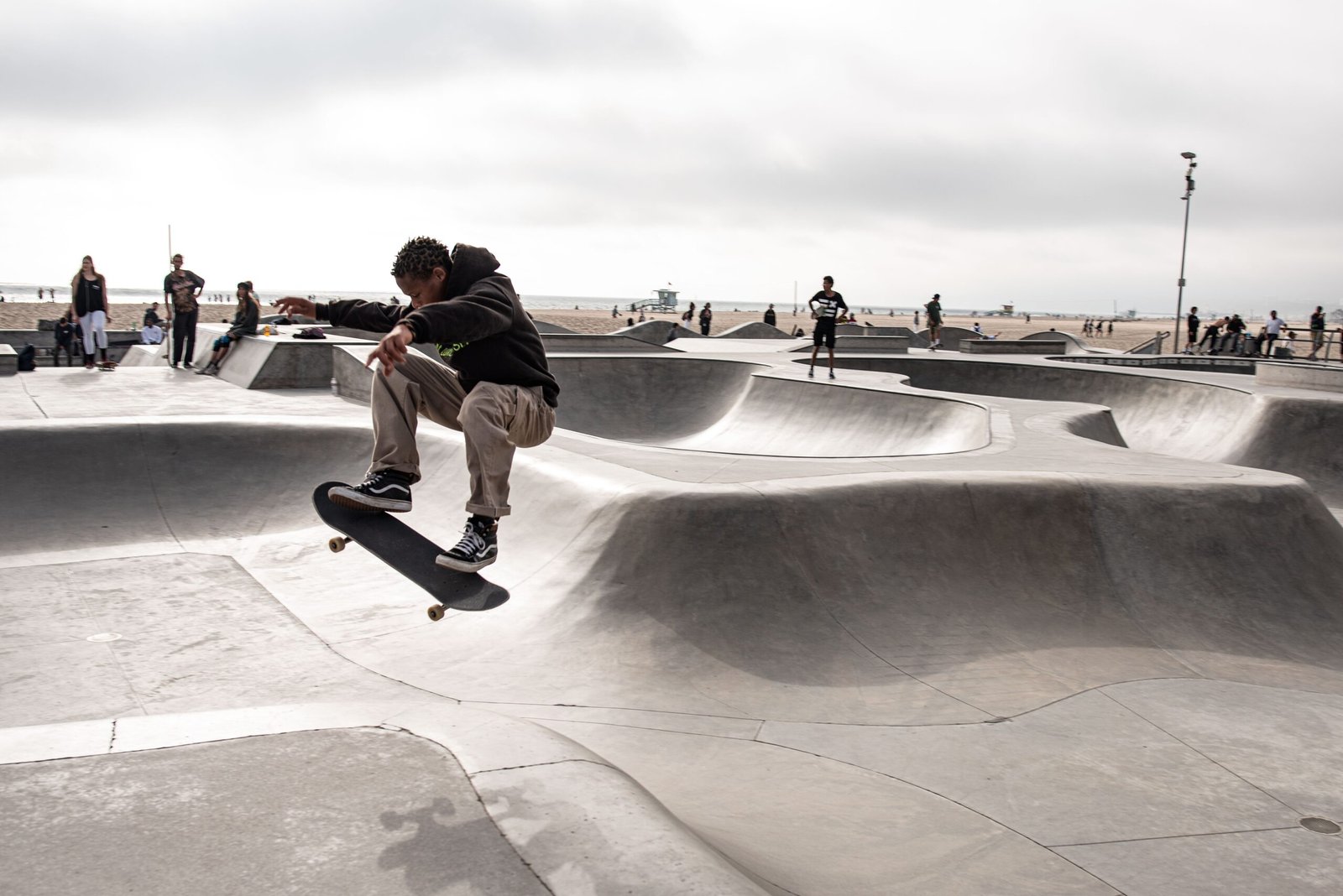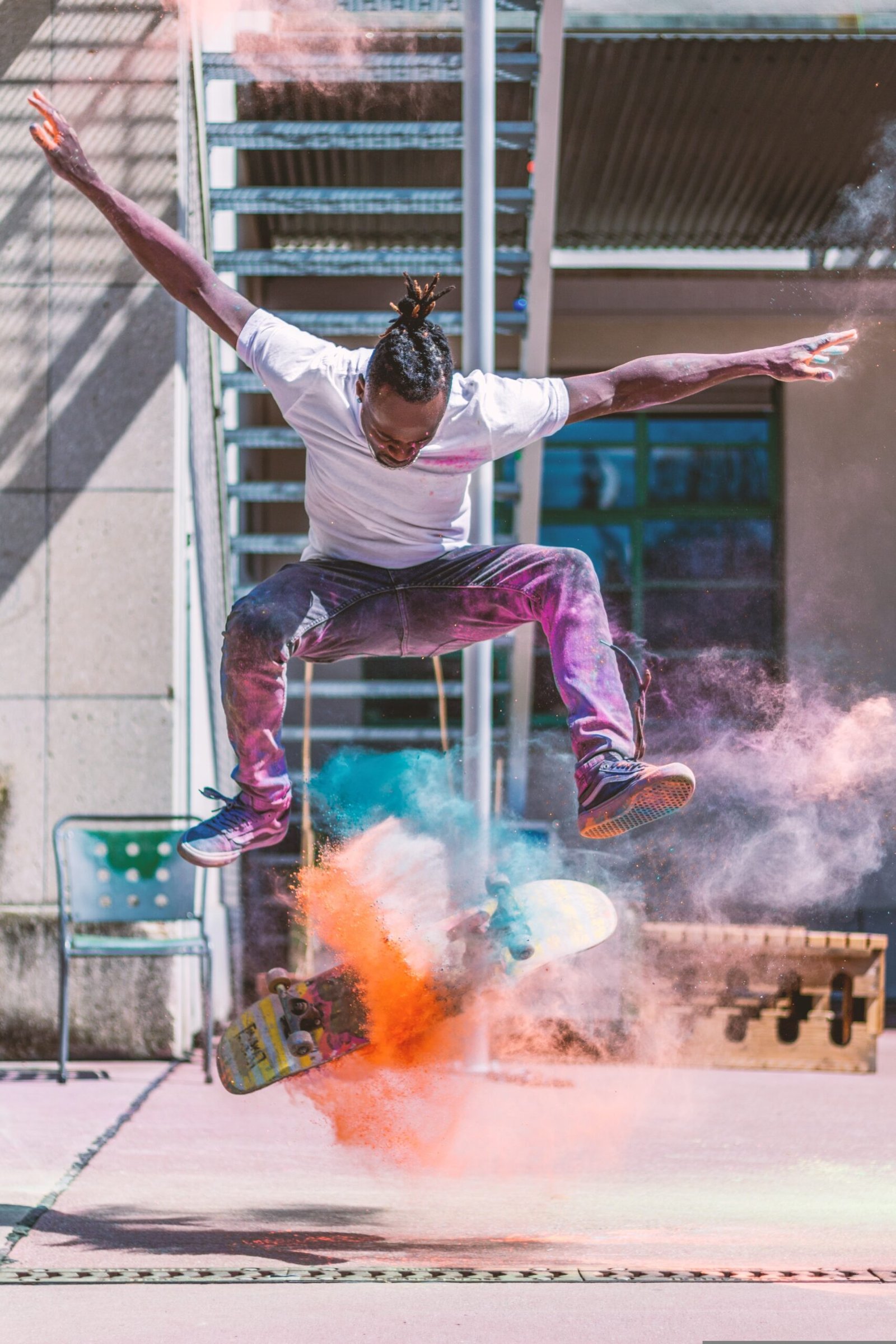Introduction to Skateboarding in the Olympics
Skateboarding, a sport characterized by its dynamic and artistic nature, has long been celebrated as a symbol of youth culture and urban creativity. Originating in the streets of Southern California during the 1950s, skateboarding quickly evolved from a pastime into a globally recognized sport. Its influence extends beyond mere recreation, impacting fashion, music, and lifestyle, making it an integral part of contemporary culture.
The journey of skateboarding to the Olympic stage is a testament to its growing legitimacy and acceptance as a competitive sport. The inclusion of skateboarding in the Olympic Games was a significant milestone, reflecting not only the sport’s popularity but also its potential to engage a younger, more diverse audience. This recognition was formalized by the International Olympic Committee (IOC) in 2016, marking a historic moment for skateboarding enthusiasts worldwide.
Skateboarding made its Olympic debut at the Tokyo 2020 Games. The event featured two disciplines: street and park, each showcasing different aspects of the sport. The street discipline involves performing tricks on urban terrain such as stairs, rails, and ledges, while the park discipline is centered around a bowl-shaped course with a variety of ramps and curves. The inclusion of these events highlighted the technical skill and creativity inherent in skateboarding, captivating audiences and earning the sport a respected place in the Olympic roster.
As the anticipation builds for the Paris 2024 Olympics, skateboarding is set to capture the spotlight again. The upcoming Games promise to further elevate the sport, providing a platform for the world’s best skateboarders to demonstrate their talents internationally. With its blend of athleticism, innovation, and cultural relevance, skateboarding is poised to continue its Olympic journey, inspiring future generations of athletes and fans alike.
Skateboarding has undergone a remarkable transformation since its inception as a counter-culture activity in the 1950s and 60s. Originally seen as a pastime for rebellious youth, skateboarding has evolved into a globally recognized competitive sport. This journey from the streets to the Olympic Games is a testament to the sport’s growing legitimacy and the dedication of its community.
The development of professional skateboarding began in earnest during the 1980s. As pioneers like Tony Hawk and Rodney Mullen began to demonstrate the sport’s potential for skill and creativity, skateboarding started to attract a wider audience. The 1990s saw an explosion in popularity, fueled by the rise of skateboarding magazines, video releases, and the establishment of major competitions such as the X Games. These events provided a platform for skateboarders to showcase their talents and gain recognition on a global scale.
Organizations like the International Skateboarding Federation (ISF) and World Skate have been crucial in the sport’s standardization and international growth. The ISF, founded in 2004, played a key role in unifying the fragmented skateboarding community and creating a formal structure for competitions. World Skate, which oversees the sport’s inclusion in the Olympic Games, has further standardized rules and regulations, ensuring consistency and fairness in competitions worldwide.
The inclusion of skateboarding in the Tokyo 2020 Olympics marked a significant milestone in the sport’s history, bringing it to the forefront of international sports. Paris 2024 is set to build on this momentum, showcasing skateboarding’s unique blend of athleticism and creativity to a global audience. As the sport continues to grow, it remains rooted in its counter-culture origins while embracing the opportunities provided by its new status as an Olympic sport.
Skateboarding’s journey from a niche activity to an Olympic event highlights the dynamic nature of sports evolution. The collaborative efforts of athletes, organizations, and enthusiasts have ensured that skateboarding not only survives but thrives on the world stage, inspiring new generations of skateboarders and fans alike.
Key Skateboarding Events and Disciplines at Paris 2024

The Paris 2024 Olympic Games will feature two primary skateboarding disciplines that have garnered significant attention since their debut at the Tokyo 2020 Olympics: street and park. These events will showcase the incredible versatility and skill of the athletes, each discipline offering a unique set of challenges and opportunities for expression.
The street discipline involves a course that mimics urban environments, complete with stairs, rails, ledges, and other obstacles. Competitors will perform a variety of tricks, including grinds, flips, and spins, to navigate through the course. Judging criteria for street skateboarding focus on the difficulty of tricks, execution, use of the course, and overall flow. Judges will look for innovative and high-risk maneuvers, rewarding skaters who push the boundaries of what is possible on a skateboard.
In contrast, the park discipline features a bowl-like structure with steep drops, curves, and a variety of vertical and horizontal surfaces. This setup allows skaters to perform aerial tricks, spins, and lip tricks, all while maintaining speed and fluidity. The park discipline emphasizes creativity and amplitude, with judges assessing the height, difficulty, and execution of tricks as well as the skater’s ability to maintain flow throughout their run.
For the Paris 2024 Olympics, there have been some modifications to the rules and judging criteria to ensure a fair and exciting competition. One notable change is the increased emphasis on the overall impression, which takes into account the skater’s style, originality, and use of the entire course. Additionally, there will be a greater focus on consistency and technical precision, rewarding athletes who can perform difficult tricks with flawless execution.
These adjustments aim to elevate the level of competition and highlight the artistic and athletic aspects of skateboarding. As we look forward to the Paris 2024 Games, the anticipation builds for what promises to be a thrilling showcase of skateboarding talent on the global stage.
Top Contenders and Rising Stars to Watch
As the Paris 2024 Olympic Games approach, the skateboarding community is abuzz with anticipation over the athletes set to compete. Among the top contenders, American skateboarder Nyjah Huston stands out. With multiple X Games gold medals and a history of dominating Street League Skateboarding (SLS) competitions, Huston’s technical prowess and consistency make him a favorite for gold in Paris. Similarly, Japan’s Yuto Horigome, who clinched the gold medal in skateboarding’s Olympic debut at Tokyo 2020, remains a formidable opponent with his innovative tricks and seamless execution.
In the women’s category, Brazilian skateboarder Rayssa Leal is a name to watch. At just 13 years old during the Tokyo 2020 Olympics, Leal captured the silver medal, impressing judges and fans with her fearless approach and high-level skills. Another prominent figure is Leticia Bufoni, also from Brazil, who brings experience and a charismatic presence, having won numerous international titles and medaled in multiple X Games.
The Paris 2024 Olympics will also shine a spotlight on emerging talent. One rising star is Sky Brown from Great Britain. Despite her young age, Brown has already made a significant impact, winning the bronze medal in the women’s park event in Tokyo 2020 and continually pushing the boundaries of the sport. Additionally, Australia’s Keegan Palmer, who secured gold in the men’s park event in Tokyo, has shown remarkable progression and could very well defend his title in Paris.
The blend of seasoned champions and promising newcomers guarantees an exhilarating skateboarding competition at the Paris 2024 Olympic Games. With a diverse array of talent from around the globe, the event promises to deliver spectacular performances and potentially historic moments in the sport’s Olympic journey.
Training and preparation for Olympic skateboarding demand a multifaceted approach, integrating physical conditioning, technical skill development, and mental fortitude. As the sport continues to evolve, athletes must adopt innovative and rigorous training strategies to excel at the Olympic level, particularly with the upcoming Paris 2024 Games.
Physical Conditioning
Physical conditioning forms the foundational aspect of an Olympic skateboarder’s regimen. Athletes engage in comprehensive strength and endurance training to enhance their overall fitness. Core stability, leg strength, and cardiovascular endurance are pivotal, allowing skateboarders to perform complex tricks and maintain high performance throughout their routines. Regular sessions of weight training, plyometrics, and aerobic exercises are standard practices to ensure optimal physical readiness.

Technical Skill Development
Mastery of technical skills is essential for competing at the Olympic level. Skateboarders spend countless hours perfecting their tricks, focusing on consistency and precision. They work on a variety of maneuvers, from basic ollies to advanced flips and grinds, continually pushing the boundaries of their capabilities. Practicing in environments that simulate competition settings, such as skate parks designed to mimic Olympic courses, is crucial for honing these skills.
Mental Preparation
The psychological aspect of training cannot be underestimated. Mental preparation involves developing resilience, focus, and the ability to perform under pressure. Techniques such as visualization, meditation, and cognitive-behavioral strategies are employed to enhance mental toughness. Athletes often work with sports psychologists to manage stress and maintain a positive mindset, crucial elements for success in high-stakes Olympic events.
Role of Coaches and Support Teams
Behind every successful Olympic skateboarder is a dedicated team of coaches and support staff. Coaches provide technical guidance, develop training plans, and offer strategic insights tailored to each athlete’s strengths and weaknesses. Nutritionists, physiotherapists, and sports scientists contribute to the athlete’s overall well-being, ensuring they are in peak form for competition. This collaborative effort is instrumental in navigating the rigorous demands of Olympic preparation.
As Paris 2024 approaches, skateboarders worldwide are intensifying their training efforts, aiming to showcase their skills on the grandest stage. The blend of physical conditioning, technical proficiency, mental resilience, and robust support systems exemplifies the holistic approach required to excel in Olympic skateboarding.
The Impact of the Olympics on the Skateboarding Community

Skateboarding’s inclusion in the Olympic Games has significantly influenced the broader skateboarding community. One of the most profound impacts is on public perception. The sport has transitioned from a counter-culture activity often associated with rebellion to a globally recognized and respected athletic discipline. This shift has helped to break down stereotypes and foster a more inclusive environment for skateboarders of all ages and backgrounds.
Another notable impact is the increase in investment and sponsorship opportunities. With the Olympic spotlight, brands and companies are more inclined to invest in skateboarding, leading to enhanced funding for athletes, improved facilities, and more extensive media coverage. This influx of financial support can accelerate the growth of the sport, providing skateboarders with the resources they need to hone their skills and compete at higher levels.
Moreover, the Olympic status of skateboarding promotes grassroots development. As skateboarding gains visibility, more young people are inspired to take up the sport. Communities and local governments are also more likely to invest in skate parks and programs, fostering a new generation of skateboarders. This grassroots movement is crucial for the sport’s long-term growth and sustainability, as it ensures a steady stream of talent and enthusiasm.
However, the integration of skateboarding into the Olympic Games has not been without controversy. Some members of the skateboarding community argue that the sport’s inclusion in the Olympics compromises its core values and culture. They fear that the emphasis on competition and commercialization might overshadow the creativity and individuality that are central to skateboarding. This debate highlights the tension between preserving the sport’s roots and embracing its evolution on a global stage.
Overall, while there are differing opinions within the community, the Olympic Games have undeniably elevated skateboarding’s profile. The increased exposure, investment, and grassroots development are likely to have lasting positive effects, even as the community navigates the complexities of its new status.
Innovations and Developments in Skateboarding Equipment
The approach to skateboarding equipment has undergone significant transformations as we head towards the Paris 2024 Olympic Games. A primary focus has been on enhancing the performance and safety of athletes, driven by advancements in skateboard design, materials, safety gear, and apparel. These innovations are not merely evolutionary but represent a substantial leap forward in the sport’s technology.
Firstly, the design of skateboards has seen notable improvements. Modern skateboards are now crafted using advanced composite materials like carbon fiber and aerospace-grade aluminum, which provide a perfect blend of lightweight and durability. These materials not only extend the lifespan of the skateboard but also allow for greater control and stability, essential qualities for executing complex tricks at the Olympic level.
Material innovation extends to the skateboard wheels and trucks as well. Polyurethane wheels have been optimized for different skateboarding disciplines, whether it’s street or park. The trucks, which attach the wheels to the board, are now designed with high-precision engineering, offering enhanced maneuverability and shock absorption. This level of refinement is crucial for athletes to achieve peak performance during high-stakes competitions.
Safety gear has also seen considerable advancements. Helmets, for instance, now incorporate multi-directional impact protection systems (MIPS), which significantly reduce the risk of concussion. Protective pads for knees, elbows, and wrists are now made with advanced foams and ergonomic designs, providing better protection without compromising the skater’s range of motion. These improvements are especially critical in ensuring athlete safety during the physically demanding routines presented at the Olympics.
Lastly, skateboarding apparel has evolved to meet the demands of competitive skating. High-performance fabrics that offer moisture-wicking and breathability are now standard, keeping athletes comfortable and focused. Additionally, the apparel is designed to be both functional and stylish, reflecting the unique culture of skateboarding while meeting the rigorous needs of Olympic competition.
Overall, the technological advancements in skateboarding equipment are setting the stage for an exciting and safer competition at the Paris 2024 Olympic Games. These innovations not only enhance the athletes’ performance but also contribute to the overall evolution of the sport.
Looking Ahead: The Future of Skateboarding in the Olympics

The inclusion of skateboarding in the Olympic Games has marked a significant milestone for the sport, bringing it to a global stage where it can be appreciated by a wider audience. As we look to the future, the trajectory of skateboarding in the Olympics appears promising, with several potential developments on the horizon. The Paris 2024 Games will undoubtedly play a crucial role in shaping the future of Olympic skateboarding, setting new standards, and inspiring the next generation of athletes.
One potential development is the introduction of new skateboarding disciplines. While street and park events have captivated audiences, there is room for expansion. Disciplines such as vert or downhill racing could be considered, adding diversity and excitement to the Olympic skateboarding roster. The inclusion of these events would not only showcase different aspects of the sport but also attract a broader range of participants and fans.
Another significant factor is the growth of skateboarding’s global fanbase. The Olympic platform provides unparalleled exposure, enabling the sport to reach new regions and demographics. As more people become acquainted with skateboarding through the Olympics, we can expect an increase in grassroots initiatives, local competitions, and skateparks worldwide. This growing interest can foster a more inclusive and expansive skateboarding community, contributing to the sport’s sustainability and evolution.
The evolution of skateboarding itself is also an important consideration. The sport is characterized by its dynamic and innovative nature, constantly pushing the boundaries of what is possible. As athletes continue to develop new tricks and techniques, the level of competition will rise, bringing more thrilling performances to the Olympic stage. This ongoing evolution will keep skateboarding fresh and engaging, ensuring its relevance in future Olympic Games.
Reflecting on the legacy of the Paris 2024 Games, it is clear that this event will have a lasting impact on skateboarding. The exposure and recognition gained from being part of the Olympics will elevate the sport to new heights, inspiring future generations of skateboarders. The Paris 2024 Games are poised to be a pivotal moment in the history of skateboarding, setting the stage for its continued growth and success in the Olympic arena.




